While growing up, my grandfather, Charlie
Finkelstein, recalls listening to the many stories his parents told him about
their lives in Poland, the grandparents, aunts, uncles and cousins that he never
knew but aspired to meet and towns and villages where he'd never been but hoped
to one day visit.
|
|
|
|
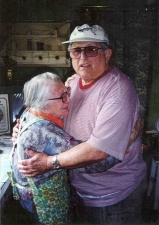
|
|
Marianna Ramotowska
(Rachel Finkielsztejn)
and Charlie Finkelstein |
|
| |
|
However, the Holocaust cast a dim light
on these dreams. After the war, my grandfather's family lost contact with their
relatives in Poland and feared that they had all perished at the hands of the
Nazis, crushing hopes that anybody in the family would ever see them again.
All the while, my grandfather maintained
a strong interest in exploring his family history and visiting the towns where
his parents grew up. Last year, he asked my brother and I if we would like to
accompany him on a trip to Poland to search our family roots and we readily
agreed. Through help from family members and research over the Internet, we
found information about our family's town, its history, and even brief mention
in a Polish newspaper article about a Holocaust survivor still living in the
village. Eager to find out more information, we departed for Warsaw and the
eventual destination of Radzilow, a small Polish shtetl in the former Lomza
Gubernia district of Northeastern Poland where my great-grandparents lived
before emigrating to the United States.
After several days of visiting sites
related to Poland's Jewish Heritage, we prepared to visit Radzilow. Together
with our Polish speaking tour guide and driver, Nelly, and the name of Rachel
Finkielsztejn, a Holocaust survivor reportedly living in Radzilow found through
our research, we embarked on the two and half hour journey from Warsaw to
Radzilow.
Much to our dismay, upon arriving in
Radzilow we found that the town offices were closed for a Polish national
holiday. However, we asked some of the village's residents if they knew of
Rachel and found a storekeeper who not only knew of her but offered to lead us
right to her home.
An older gentleman greeted us at the door
and we explained, with Nelly's help, that we were members of the Finkelstein
family and were searching for Rachel Finkielsztejn because we thought that she
might be a relative. The older gentleman led us into the house where a small,
frail woman lay on the couch. Nearly blind and almost deaf, the woman barely
lifted her head to look at us. We introduced ourselves and my grandfather asked
her if she spoke Yiddish, but she said that it had been over sixty years and she
had forgotten.
Instead, Rachel began to recount in
Polish the amazing story of how she survived the Holocaust. Born in 1910, Rachel
lived on the grounds of her family's mill outside Radzilow prior to the war.
Although her father died when she was just three years old, Rachel was close
with her mother, older brother and sister, and her many aunts, uncles, and
cousins who lived with her on the property adjacent to the mill.
|
|
|
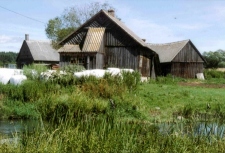 |
|
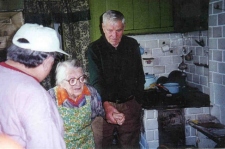 |
|
Marianna and Stanislaw Ramotowski
inside their home, just outside town,
in a village called Dziewiecin,
2 km away along Szczuczynska Street |
|
|
| |
|
As a young girl prior to the war, Rachel
developed a friendship with a young gentile man named Stanislaw Ramotowski. The
two became close and their friendship blossomed into a romance until it was
interrupted by the war. Nazi soldiers infiltrated Radzilow in 1941 and
immediately began threatening and terrorizing the town's Jewish residents. The
Poles stripped Rachel and her family of nearly everything they owned, seized
their property and destroyed the family's mill that had been operating for generations.
By the end of 1941, the Nazis cordoned all of the town's remaining Jews,
including Rachel and her family, into a tiny area of town that became the local
Jewish ghetto. [Those few Jews who managed to escape the pogrom of July 7 were
herded into the Synagogue and that constituted the "ghetto." That number
is unknown, but it was less than 20. Ramotowski himself told about "few people."
Stanislaw had hidden Rachel during the pogrom, but some of his neighbors
thereafter told the Germans where she was hiding. A Pole who worked
in the police office came and took her to the Radzilow ghetto.]
Despite the continuous Nazi threats and
their physical separation, Rachel and Stanislaw remained close. At night,
Stanislaw smuggled food, clothing and other necessities to Rachel and her family
in the ghetto. Late one night, Stanislaw daringly helped Rachel's escape from
the ghetto and the pair darted off to hide in the Polish countryside. Infuriated
that a local gentile had helped a Jew escape, the Nazis increased security
around the ghetto area and combed the area to search for Rachel and Stanislaw.
[Rachel's family remained behind in the ghetto and were sent to Bogusze; and
later to Treblinka.]
Rachel and Stanislaw lived in constant
fear of the Nazis, frequently moving around the countryside to elude Nazi
capture and never giving up hope that the war would soon end and that Rachel
would be reunited with her family.
However, in 1942, the Nazis closed the
Jewish ghetto, loaded all of Radzilow's Jewish population into boxcars and sent
them to the Treblinka death camp. Rachel never saw any of them ever again.
Upon conclusion of the war in 1945 and
after four years of hiding, Rachel and Stanislaw married and returned to
Rachel's family's property outside Radzilow. Rachel changed her name to Marianna
Ramotowski and the couple moved on with their lives.
After she finished telling her story, we
peppered Rachel with questions about her family history and found that Rachel
was indeed a long-lost family member of ours, a first cousin to my grandfather's
father, Jacob Finkelstein. While Rachel did not remember Jacob or his brothers
and cousins who emigrated to the United States when she was just a small child,
she did remember another of Jacob's brothers who emigrated to Cuba in the early
1930s and mentioned that she had been close with my grandfather's paternal
grandparents, David and Mariem Finkelstein.
|
|
|
|
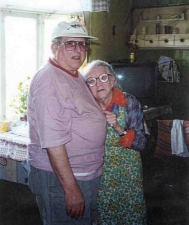
|
|
Charlie Finkelstein and
Marianna Ramotowska |
|
| |
|
The realization that she had located some
of her long-lost relatives launched Rachel into a whirlwind of emotions. The
frail woman who only minutes before could barely lift her head had energetically
risen from the couch and was hugging my grandfather, with tears streaming down
her face.
As we were about to leave, Rachel then
clenched my grandfather's hand and did something that she had not done in nearly
sixty years - she spoke to him in Yiddish. A couple of words turned into complete
sentences and before long it was clear that our unexpected visit and reminiscing
about her past enabled Rachel to truly reconnect with her Jewish heritage and
the family she once thought had all been lost.
Editor's note: This reunion would not
have occurred without the article written by Andrzej Kaczynski in the major
Polish newspaper Rzeczpospolita, about the
Holocaust in Radzilow. He had first written a ground-breaking piece
dealing with the events of the
Holocaust in Jedwabne, which is only 9 miles away to the SSW. The two
towns shared a lot in common, lifestyles and family interconnections. From my
own research, I knew that similar tragedies took place in Radzilow during the
same fateful days in July of 1941. In fact, the author mentioned it briefly in
the initial article. I tracked him down through the Internet and told him about
my web page and some of the Holocaust material I've had translated, suggesting
that he do a follow-up. The second article is the result of that effort. Though
my Polish is limited to translation basics, I knew enough to comprehend that the
lady pictured in his article was Rachel Finkielsztejn (who changed her name to
Marianna Ramotowski after marrying the man who rescued her). I had been helping
two landsmen with the dozens and dozens of Finkielsztejn records that exist in
this town going back to the early 1800's, and let both of them know about the
story. She was surely related to one of them. It just so happened that a cousin
(Charlie Finkelstein) of one of them was traveling to Poland in the coming month
and set out to find her.
Postscript: Stanislaw Ramotowski passed away in
2002. Marianna went to live in Warsaw after that and has since passed away.
|
|
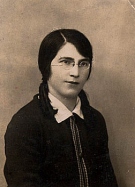
Marianna, while she was still
known as Rachel Finkielsztejn.
[Most likely taken in Lomza, early 1930's] |
|
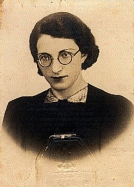
Rachel in Kielce, late 1930's |
|
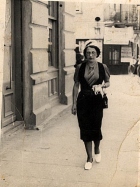
Rachel in Kielce, late 1930's |
|
|
Note about photos below:
Rachel/Marianna's mother was originally from Kielce, a city 190 miles to
the SW of Radzilow. Her full maiden name was Sora Jankielewski. Sora's
family was wealthy and well-educated. One of her brothers was an engineer,
another a doctor, and a third, not known. But they didn't have enough
money or luck to find a good husband for Sora in Kielce, so they found the
owner of a mill (Yitzhak Finkielsztejn) in Radzilow, quite a distance away
in those days. Rachel was born in Radzilow in 1910. She finished primary
school there, but her mother wanted a better life for her in the big city
and so she sent her to the family of her brother back in Kielce, where she
finished gymnasium. Rachel came back often to Radzilow for vacations, but
when the war broke out in 1939 she came back to Radzilow for good and
found herself there on July 7, 1941, the day almost all of the town's
residents, including her parents and siblings, were herded into a barn and
set afire. Rachel survived, thanks to Stanislaw Ramotowski. |
|
|
|
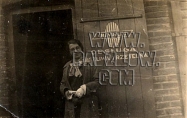
Rachel in front of the
Chevrolet Agency in Kielce,
where she worked, late 1930's |
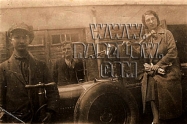
Rachel in front of the
Chevrolet Agency in Kielce,
where she worked, late 1930's |
|
|
|
|
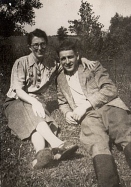
Marianna and Stanislaw
Radzilow, 1950's |
|
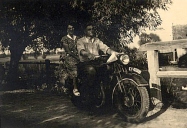
Marianna and Stanislaw
Radzilow, 1950's |
|
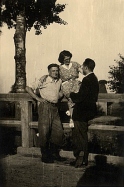
Marianna, Stanislaw, and friend
Radzilow, 1950's |
|
|
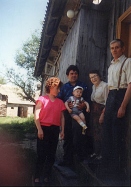
Marianna, Stanislaw, and family
Radzilow, 1990's |
|
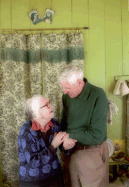
Marianna and Stanislaw
Radzilow, 2000 |
|
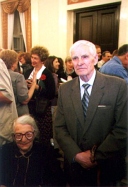
Marianna and Stanislaw Ramotowski
at a reception given by Pres. Kwasniewski, Presidential Palace, Warsaw, July 2001 |
|
|
|